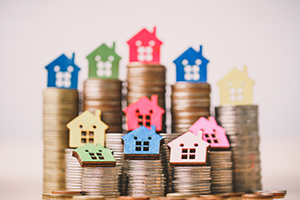| If you can't see the newsletter, or would like to view it online, use this link | If you have received this newsletter indirectly and would like to be added to our distribution list, use this link |
 |
 |
| Provided to you Exclusively by Gregory Pavlich |
|
|
For the Month of March 2025 --- Vol. 19, Issue 4
|
| In This Issue |
"There is nothing like staying at home for real comfort." - Jane Austen What to Watch: Economic activity plays a critical role in shaping housing markets, driving prices, affordability, supply, and demand. For aspiring homeowners, the path to the American Dream hinges on how these forces align in 2025. Housing: Before you buy, renovate, or launch a business from home, follow these expert research tips to make sure zoning laws don't stand in your way. Home Improvement: Aging in place is possible with the right home updates. Here's how to make your home senior-friendly so you can live comfortably and independently. Q and A: Thinking about buying a home with solar panels? Learn how to ask the right questions to make sure it's a smart investment. Please feel free to forward this newsletter to friends, family or co-workers who may find it helpful. |
| What to Watch |
Home borrowing costs, economic activity, inflation, and tariffs will dominate headlines in the coming months, and their outcomes could significantly influence consumer sentiment toward achieving the American Dream of homeownership. Fixed mortgage rates, particularly the 30-year, have eased from their multi-year peak of nearly 8% in fall 2023 but remain stuck just above 6.5%. According to Fannie Mae's March Commentary, rates are expected to decline throughout 2025, potentially sparking a modest uptick in housing activity. “We think mortgage rates will dip even lower within the next quarter, closing the year around 6.3%, which could entice some sidelined buyers back into the market,” said Mark Palim, Fannie Mae's Senior Vice President and Chief Economist. Economic activity plays a critical role in shaping housing markets, driving prices, affordability, supply, and demand. Robust job growth, rising wages, or new industries can ignite housing demand, while slowdowns, triggered by recessions or high interest rates, often cool it off. Meanwhile, inflation and tariffs cast a shadow of uncertainty over consumers and businesses alike. Inflation erodes purchasing power from both the demand and cost sides, while tariffs disrupt supply chains and inflate prices. Together, they create a double whammy, prompting businesses to pause investment and hiring, and leaving consumers hesitant to spend as they await clarity. The bottom line? The interplay of falling mortgage rates, economic momentum, and the inflationary pressures of tariffs will determine whether the housing market gains traction or stalls. For aspiring homeowners, the path to the American Dream hinges on how these forces align in 2025. Source: Mortgage Market Guide |
| Housing News |
Zoning laws shape how homeowners may use their land. These regulations can impact everything from home renovations to whether you may legally operate a business from your residence. Whether you're in the market for a new house or considering making changes to your existing property, researching the zoning laws in your area can help you avoid legal headaches. Identify Your Property's Zone Type Cities and counties divide land into residential, commercial, industrial, and agricultural areas. Each zone has different building restrictions that can impact property value. For example, a home in a desirable residential zone that is close to amenities such as parks and schools may retain a higher value. On the other hand, properties near industrial zones may see lower values due to noise and environmental factors. To determine how a property is classified, request local ordinances and zoning maps from the city's planning department. You may be able to find this information on their website. Pay Attention to Home Renovation Restrictions Some areas have strict guidelines on lot size and building height that may limit modifications. Check with your city or county before adding a new structure or room onto your property. You may also need permission to convert a space such as a garage or a shed into a living area, especially if you plan to rent it out. Research Business Regulations If you're in a residential zone and wish to operate a business from your home, make sure you're permitted to do so. While some cities and counties allow homeowners to use their residential address for business operations, there may be restrictions regarding signage and advertising. Zoning laws may also limit customer visits and business-related traffic. If you live in a planned community, you should also check the homeowners association's covenants, conditions, and restrictions. These rules can be even stricter than standard zoning laws. Take the time to do your research, and consult with a real estate professional before purchasing a new property to make sure it's suited to your needs. Sources: Hunterofhomes.com, Nolo.com |
| Home Improvement |
Many seniors would prefer to stay in their homes rather than move into assisted living facilities. However, mobility and health needs change as we age. Whether you're planning ahead for yourself or want to keep a loved one safe, the right home modifications are a must for safety and comfort. Here are some practical home updates for aging in place. Install Safer Flooring Slips and falls are one of the biggest risks for older adults. To minimize accidents, replace loose rugs with slip-resistant carpets or remove them entirely. Opt for low-impact flooring, such as rubber or cork, to provide better traction and cushioning. In high-risk areas, such as bathrooms and kitchens, use non-slip mats. Update Bathrooms Bathrooms are one of the most dangerous places for seniors, but small changes can improve safety. Install grab bars near toilets and in showers for extra support. Another low-cost upgrade is to switch to a handheld showerhead to reduce strain while bathing. If it's in your budget, consider swapping out bathtubs for walk-in showers with built-in seating. Focus on Accessibility Install ramps at entryways to eliminate the need for stairs. Stairlifts also provide a safe, motorized option. Replace doorknobs with lever handles that are easier to grip, and widen doorways to accommodate walkers or wheelchairs. Home updates can be expensive, but financial assistance is available. Research government grants, low-interest loans, and tax deductions for medically necessary home changes. Medicare Advantage plans may also cover certain safety modifications. Sources: Assistedliving.org, Thehelperbees.com |
| Q&A |
| What Should I Know About Buying a Home With Solar Panels, Whether Owned or Leased?
Question: What should I consider when buying a home with solar panels? Answer: Purchasing a home with solar panels might seem like a great investment, but it's important to do some research before making an offer. First, ask whether the panels are owned or leased. Owned panels can add value to the home, while leased panels may require transferring the lease agreement to the new homeowner. Next, assess the age and efficiency of the system. While solar panels typically last 20 to 25 years, inverters may need to be replaced sooner. Also, consider how much sunlight the roof receives to determine whether the system can generate enough energy to provide significant savings. Finally, ask about warranties, maintenance requirements, and potential tax incentives. Sources: Bobvila.com, Energy.gov |





